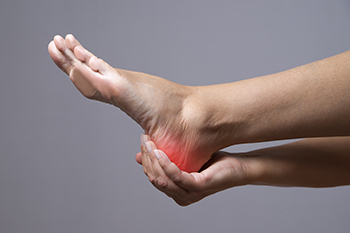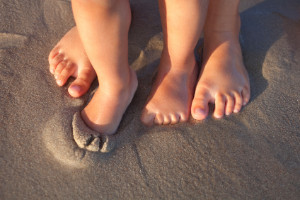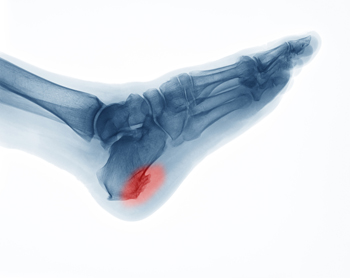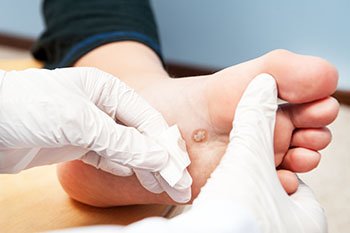Items filtered by date: February 2023
Heel Pad Syndrome

There are several reasons why heel pain can develop, and one cause is heel pad syndrome. While heel pads break down due to normal use and aging, excessive wear and tear or injury can cause the heel pads to shrink in size. This condition can also result from obesity, other health or foot conditions, or from wearing poorly cushioned shoes. Heel pads are like shock absorbing cushions in the heels. They are composed of fat and flexible, but tough fibers. They not only absorb shock from the impact of standing and mobility, they help to distribute the body weight and protect the bones and joints in the foot. With this syndrome, the heel pads lose their elasticity and shock-absorbing capacity, and severe pain in the middle of the heel can develop. It can feel similar to a bad bruise without being visible. The good news is that this is a treatable condition which may improve with exercise. Since it is difficult to distinguish one cause of heel pain from another, it is suggested that you visit a podiatrist for a proper diagnosis and treatment for your particular heel pain.
Many people suffer from bouts of heel pain. For more information, contact Patrick Bruton, DPM of Big Country foot and Ankle. Our doctor can provide the care you need to keep you pain-free and on your feet.
Causes of Heel Pain
Heel pain is often associated with plantar fasciitis. The plantar fascia is a band of tissues that extends along the bottom of the foot. A rip or tear in this ligament can cause inflammation of the tissue.
Achilles tendonitis is another cause of heel pain. Inflammation of the Achilles tendon will cause pain from fractures and muscle tearing. Lack of flexibility is also another symptom.
Heel spurs are another cause of pain. When the tissues of the plantar fascia undergo a great deal of stress, it can lead to ligament separation from the heel bone, causing heel spurs.
Why Might Heel Pain Occur?
- Wearing ill-fitting shoes
- Wearing non-supportive shoes
- Weight change
- Excessive running
Treatments
Heel pain should be treated as soon as possible for immediate results. Keeping your feet in a stress-free environment will help. If you suffer from Achilles tendonitis or plantar fasciitis, applying ice will reduce the swelling. Stretching before an exercise like running will help the muscles. Using all these tips will help make heel pain a condition of the past.
If you have any questions please contact our offices located in Abilene, and Brownwood, TX . We offer the newest diagnostic and treatment technologies for all your foot and ankle needs.
Why Are My Child’s Feet Peeling?

If a child’s feet are peeling, it is usually from something benign, such as dry skin, athlete’s foot, or another type of skin condition. Skin typically regenerates itself and at the end of the cycle, dead skin sloughs off. This happens naturally when the feet are washed regularly and if this does not happen, the flaking and peeling will be noticeable. Peeling can also result from dehydration, dry air, or a related type of skin damage. For example, if the feet get sunburnt or blisters develop, the skin will eventually peel. Athlete’s foot and eczema can be other reasons for peeling skin, and they can cause inflammation, itching, and scaling. There are other serious reasons for peeling skin, so if your child’s feet are peeling and you are not aware of the cause, it is wise to seek counsel from a podiatrist who can evaluate the condition and provide appropriate treatment.
Making sure that your children maintain good foot health is very important as they grow. If you have any questions, contact Patrick Bruton, DPM of Big Country foot and Ankle. Our doctor can provide the care you need to keep you pain-free and on your feet.
Keeping Children's Feet Healthy
Having healthy feet during childhood can help prevent medical problems later in life, namely in the back and legs. As children grow, their feet require different types of care. Here are some things to consider...
Although babies do not walk yet, it is still very important to take care of their feet.
Avoid putting tight shoes or socks on his or her feet.
Allow the baby to stretch and kick his or her feet to feel comfortable.
As a toddler, kids are now on the move and begin to develop differently. At this age, toddlers are getting a feel for walking, so don’t be alarmed if your toddler is unsteady or ‘walks funny’.
As your child gets older, it is important to teach them how to take care of their feet.
Show them proper hygiene to prevent infections such as fungus.
Be watchful for any pain or injury.
Have all injuries checked by a doctor as soon as possible.
Comfortable, protective shoes should always be worn, especially at play.
If you have any questions please feel free to contact our offices located in Abilene, and Brownwood, TX . We offer the newest diagnostic and treatment technologies for all your foot and ankle needs.
The Etiology of Heel Spurs

A heel spur is essentially a hook-shaped bony formation that can sometimes develop on the underside of an individual’s heel bone. The spur will grow and point toward the toes of the foot. Interestingly, there has been some debate within the scientific community about the exact etiology, or cause, of heel spurs. For example, one’s hereditary propensity towards heel spurs was thought to be a contributing factor to the development of heel spurs. Today, it is primarily thought that excessive pronation is the main culprit for heel spurs. Overpronation is associated with unnatural biomechanics of the feet. This is all to say that excessive pressure or an awkward way of moving the feet when engaging in physical activity can contribute significantly to the development of heel spurs. Consider contacting a podiatrist today for more information about heel spurs and for any treatment that you might need.
Heel spurs can be incredibly painful and sometimes may make you unable to participate in physical activities. To get medical care for your heel spurs, contact Patrick Bruton, DPM from Big Country foot and Ankle. Our doctor will do everything possible to treat your condition.
Heels Spurs
Heel spurs are formed by calcium deposits on the back of the foot where the heel is. This can also be caused by small fragments of bone breaking off one section of the foot, attaching onto the back of the foot. Heel spurs can also be bone growth on the back of the foot and may grow in the direction of the arch of the foot.
Older individuals usually suffer from heel spurs and pain sometimes intensifies with age. One of the main condition's spurs are related to is plantar fasciitis.
Pain
The pain associated with spurs is often because of weight placed on the feet. When someone is walking, their entire weight is concentrated on the feet. Bone spurs then have the tendency to affect other bones and tissues around the foot. As the pain continues, the feet will become tender and sensitive over time.
Treatments
There are many ways to treat heel spurs. If one is suffering from heel spurs in conjunction with pain, there are several methods for healing. Medication, surgery, and herbal care are some options.
If you have any questions feel free to contact our offices located in Abilene, and Brownwood, TX . We offer the latest in diagnostic and treatment technology to meet your needs.
Plantar Warts in Public Pools

Plantar warts are affected areas of the skin on the bottom, or soles, of the feet. Importantly, the plantar warts are spread by the human papillomavirus. There are certain areas and environments in which the spread of this virus is more likely or expected. For example, public swimming pools are a primary breeding ground for the development of plantar warts. This is because many people are often walking around the sides of pools without any shoes. Also, this virus thrives in moist, warm environments. There are several things that you might consider doing to protect your feet from developing plantar warts if you regularly frequent public pools. Most importantly, you might consider simply wearing flip flops or some form of foot protection when walking around the pool. This protects the feet from making contact with any substances that can lead to the development of plantar warts. Contact a podiatrist today for more information.
Plantar warts can be very uncomfortable. If you need your feet checked, contact Patrick Bruton, DPM from Big Country foot and Ankle. Our doctor will assist you with all of your foot and ankle needs.
About Plantar Warts
Plantar warts are the result of HPV, or human papillomavirus, getting into open wounds on the feet. They are mostly found on the heels or balls of the feet.
While plantar warts are generally harmless, those experiencing excessive pain or those suffering from diabetes or a compromised immune system require immediate medical care. Plantar warts are easily diagnosed, usually through scraping off a bit of rough skin or by getting a biopsy.
Symptoms
- Lesions on the bottom of your feet, usually rough and grainy
- Hard or thick callused spots
- Wart seeds, which are small clotted blood vessels that look like little black spots
- Pain, discomfort, or tenderness of your feet when walking or standing
Treatment
- Freezing
- Electric tool removal
- Laser Treatment
- Topical Creams (prescription only)
- Over-the-counter medications
To help prevent developing plantar warts, avoid walking barefoot over abrasive surfaces that can cause cuts or wounds for HPV to get into. Avoiding direct contact with other warts, as well as not picking or rubbing existing warts, can help prevent the further spread of plantar warts. However, if you think you have developed plantar warts, speak to your podiatrist. He or she can diagnose the warts on your feet and recommend the appropriate treatment options.
If you have any questions please feel free to contact our offices located in Abilene, and Brownwood, TX . We offer the newest diagnostic and treatment technologies for all your foot and ankle needs.

